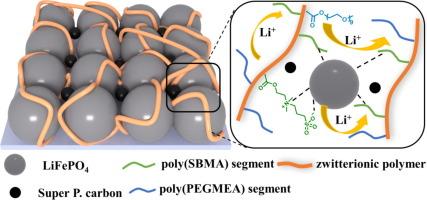Zwitterionic polymer as binder for LiFePO4 cathodes in lithium-ion batteries
IF 13.3
1区 工程技术
Q1 ENGINEERING, CHEMICAL
引用次数: 0
Abstract
Polymer binder plays a decisive role in the electrodes of lithium-ion batteries (LIBs) to stick the active materials and conductive additives firmly onto the current collector and to maintain the integrity of electrodes during charging and discharging. The widely used binder for the LiFePO4 (LFP) cathodes is polyvinylidene fluoride (PVDF), which suffers poor adhesion strength and is lack of both electronic and lithium-ion conductivities. Herein, we have synthesized a series of zwitterionic polymers (ZIPs) and then are used as aqueous polymer binder for LFP cathodes. Ascribed to the zwitterionic segment in ZIPs, the ZIPs show excellent structural stability in liquid electrolyte and high adhesion. In addition, the ethylene oxide (EO) units and the zwitterionic segment in the binder effectively promote the Li+ transportation as indicated by the higher Li+ conductivity and the two times higher diffusion coefficient of lithium ions (DLi+) at 3.48 × 10−12 cm2 s−1 than those at case of PVDF. The LFP/Li half cells employing the optimized ZIP binder exhibit a high discharge specific capacity of 111.2 mAh g−1 and a high capacity retention of 93.4 % at 3C current density after 500 cycles, which is much better than the cells employing the PVDF binder.

两性离子聚合物作为锂离子电池LiFePO4阴极的粘结剂
聚合物粘结剂在锂离子电池(LIB)的电极中起着决定性作用,它能将活性材料和导电添加剂牢固地粘附在集流体上,并在充放电过程中保持电极的完整性。目前广泛使用的磷酸铁锂(LFP)阴极粘结剂是聚偏二氟乙烯(PVDF),这种粘结剂粘附强度差,而且缺乏电子导电性和锂离子导电性。在此,我们合成了一系列齐聚物(ZIPs),并将其用作 LFP 阴极的水性聚合物粘合剂。ZIPs 在液态电解质中表现出优异的结构稳定性和高粘附性,这要归功于 ZIPs 中的齐聚物段。此外,粘合剂中的环氧乙烷(EO)单元和齐聚物段有效地促进了锂离子的传输,表现在锂离子电导率更高,锂离子扩散系数(DLi+)为 3.48 × 10-12 cm2 s-1,是 PVDF 的两倍。采用优化 ZIP 粘合剂的 LFP/Li 半电池在 500 次循环后的放电比容量高达 111.2 mAh g-1,在 3C 电流密度下的容量保持率高达 93.4%,远远优于采用 PVDF 粘合剂的电池。
本文章由计算机程序翻译,如有差异,请以英文原文为准。
求助全文
约1分钟内获得全文
求助全文
来源期刊

Chemical Engineering Journal
工程技术-工程:化工
CiteScore
21.70
自引率
9.30%
发文量
6781
审稿时长
2.4 months
期刊介绍:
The Chemical Engineering Journal is an international research journal that invites contributions of original and novel fundamental research. It aims to provide an international platform for presenting original fundamental research, interpretative reviews, and discussions on new developments in chemical engineering. The journal welcomes papers that describe novel theory and its practical application, as well as those that demonstrate the transfer of techniques from other disciplines. It also welcomes reports on carefully conducted experimental work that is soundly interpreted. The main focus of the journal is on original and rigorous research results that have broad significance. The Catalysis section within the Chemical Engineering Journal focuses specifically on Experimental and Theoretical studies in the fields of heterogeneous catalysis, molecular catalysis, and biocatalysis. These studies have industrial impact on various sectors such as chemicals, energy, materials, foods, healthcare, and environmental protection.
 求助内容:
求助内容: 应助结果提醒方式:
应助结果提醒方式:


